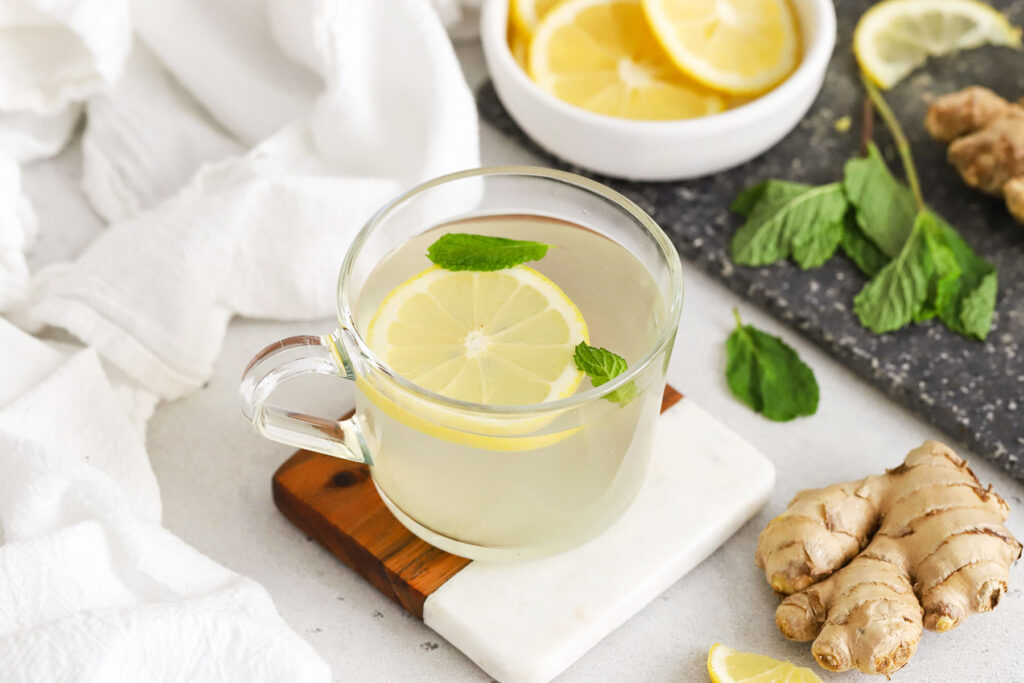Lemon ginger tea, a harmonious fusion of zesty citrus and warm spice, offers a symphony of flavors and a treasure trove of health benefits. Combining the invigorating tang of lemon with the soothing warmth of ginger, this aromatic beverage has been cherished for centuries for its refreshing taste and wellness-promoting properties. In this comprehensive guide, we’ll explore the origins, preparation methods, health benefits, and culinary uses of lemon ginger tea, inviting you to savor its delightful essence and reap its many rewards.
Also Read: 10 Lemon Tea Benefits For A Refreshing Elixir of Wellness
Origins and Cultural Significance
The origins of lemon ginger tea can be traced back to ancient times, where both lemon and ginger were valued for their medicinal properties in traditional healing systems such as Ayurveda and Traditional Chinese Medicine (TCM). Lemon, with its high vitamin C content and refreshing flavor, was prized for its immune-boosting and detoxifying properties, while ginger, known for its spicy warmth and digestive benefits, was revered for its ability to soothe stomach ailments and alleviate nausea.

Over the centuries, the combination of lemon and ginger became a popular remedy for various health conditions, including colds, flu, indigestion, and inflammation. Lemon ginger tea gained popularity around the world for its invigorating taste and therapeutic effects, becoming a staple beverage in many cultures and cuisines. Today, this tea is enjoyed not only for its health benefits but also for its versatile flavor profile, making it a beloved choice for both wellness enthusiasts and tea connoisseurs alike.
Preparation Methods: How to Make Lemon Ginger Tea?!
Lemon ginger tea can be prepared in various ways, depending on personal preference and desired intensity of flavor. Here are some common methods for making this delightful beverage.
Fresh Ingredients
Start with fresh lemons and ginger root for the best flavor and aroma. Choose organic lemons whenever possible to avoid pesticides and chemicals.
Ingredients Ratio
For a balanced flavor, use approximately one tablespoon of freshly grated ginger root and the juice of one lemon per cup of water. Adjust the quantities according to taste preferences.
Simple Infusion
To make a simple infusion, bring water to a boil in a saucepan or kettle. Add freshly grated ginger root and allow it to simmer for 5-10 minutes to extract the flavor. Remove from heat, add freshly squeezed lemon juice, and let it steep for an additional 2-3 minutes. Strain the tea and serve hot.
Enhanced Flavor
For a more intense flavor, you can add additional ingredients such as honey, cinnamon, cloves, or mint leaves to the tea. These complementary flavors can further enhance the taste and aroma of lemon ginger tea.
Cold Brew
To make cold-brewed of this tea, place freshly grated ginger root and lemon slices in a pitcher of cold water. Let it steep in the refrigerator for several hours or overnight. Strain the tea and serve over ice for a refreshing summer beverage.
Tea Bags or Loose Leaf
This tea is also available in tea bags or loose-leaf form for convenience. Simply steep the tea bag or loose leaves in hot water according to package instructions, then add freshly squeezed lemon juice for extra flavor.
Health Benefits of Lemon Ginger Tea
Lemon ginger tea offers a wide range of health benefits, thanks to the potent combination of lemon and ginger, each with its unique therapeutic properties. Here are some of the key benefits of incorporating this healthy tea into your daily routine.
Immune Support
Both lemon and ginger are rich in antioxidants and vitamin C, which help strengthen the immune system and protect against infections. So, drinking this beverage regularly can help boost your body’s natural defenses and reduce the risk of colds, flu, and other common illnesses.

Digestive Aid
Ginger is well-known for its digestive benefits, including relieving nausea, indigestion, and bloating. Lemon ginger tea can help soothe an upset stomach, promote healthy digestion, and alleviate gastrointestinal discomfort.

Anti-inflammatory Properties
Ginger contains potent anti-inflammatory compounds called gingerols, which can help reduce inflammation and alleviate symptoms of inflammatory conditions such as arthritis and joint pain. That’s why, this tea may help ease pain and improve mobility in individuals with inflammatory disorders.

Nausea Relief
Ginger has long been used as a natural remedy for nausea and motion sickness. Drinking it can help alleviate nausea, whether it’s due to morning sickness, chemotherapy, or travel-related motion sickness.

Weight Management
Lemon ginger tea may aid in weight management by boosting metabolism, promoting fat burning, and reducing appetite. Ginger has thermogenic properties that can increase calorie expenditure, while lemon juice helps detoxify the body and support digestion.

Respiratory Health
The warming properties of ginger and the vitamin C content of lemon make this tea beneficial for respiratory health. It can help relieve symptoms of respiratory infections, such as coughs, congestion, and sore throat, and promote easier breathing.

Antioxidant Protection
Lemon ginger tea is rich in antioxidants, which help neutralize harmful free radicals and protect cells from oxidative damage. Regular consumption of this healthy beverage may help reduce the risk of chronic diseases and slow down the aging process.
Stress Reduction
The aroma of this tea has a calming effect on the mind and body, helping to reduce stress and anxiety. Sipping on a warm cup of it can promote relaxation and enhance overall well-being.

Hydration Support
Lemon ginger tea is a hydrating beverage that can help replenish fluids and electrolytes lost through sweat and urination. It’s a healthier alternative to sugary drinks and caffeinated beverages, providing refreshment without added calories or caffeine.
Skin Health
The antioxidants and vitamin C found in lemon ginger tea can help promote healthy skin by protecting against oxidative damage and supporting collagen production. Drinking this beverage regularly may help improve skin elasticity, reduce inflammation, and maintain a youthful complexion.
Don’t Miss: 10 Jasmine Tea Benefits for Amazing Health & Wellness!
Culinary Uses of Lemon Ginger Tea
In addition to its health benefits, lemon ginger tea can be used in various culinary applications to add flavor and depth to dishes. Here are some creative ways to incorporate this awesome tea into your recipes.
Marinades
Use brewed tea as a base for marinades for chicken, fish, or tofu. The citrusy flavor of lemon and the warmth of ginger will infuse your dishes with a delightful aroma and taste.
Salad Dressings
Add brewed tea to homemade salad dressings for a burst of flavor and freshness. Combine it with olive oil, honey, mustard, and herbs for a delicious dressing to drizzle over greens.
Sauces and Glazes
Reduce brewed tea to a syrupy consistency and use it as a glaze for roasted vegetables, grilled meats, or stir-fried tofu. The tangy sweetness of the tea will add depth and complexity to your dishes.
Baked Goods
Replace some of the liquid in baking recipes with brewed tea to add moisture and flavor. Lemon ginger tea pairs well with citrus-flavored cakes, muffins, and quick breads.
Cocktails and Mock tails
Use brewed tea as a base for refreshing cocktails and mock tails. Mix it with vodka, gin, or rum for a zesty cocktail, or combine it with sparkling water and fresh fruit for a non-alcoholic spritzer.
Ice Cream and Sorbet
Infuse brewed tea into homemade ice cream or sorbet for a unique and refreshing treat. The bright flavors of lemon and ginger will complement the creamy texture of the frozen dessert.
Conclusion
Lemon ginger tea is not only a delicious and refreshing beverage but also a potent elixir of wellness, offering a multitude of health benefits for the mind, body, and soul. From immune support and digestive aid to anti-inflammatory properties and stress reduction, this healthy beverage has something to offer for everyone. Whether enjoyed hot or cold, on its own or as an ingredient in recipes, lemon ginger tea is sure to delight your taste buds and nourish your spirit. So brew a cup of this delightful blend, savor its aromatic essence, and embrace the goodness of this excellent tea in your daily life. Hopefully, you have enjoyed reading and found this article helpful enough. If you really did then let us know your valuable unfiltered thoughts in the comment section down below. Thanks for visiting and appreciating our work.
